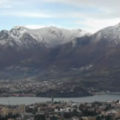Yes, I know the games ended a while ago, but I’m only now getting to see the part I actually care about – the equestrian events. It seems that local television in each country concentrates on those events at which the locals are expected to excel, and Italy didn’t expect much from its horsemen. On one of the Internet discussion boards that I frequent, someone who was vacationing in Italy during the Olympics remarked that, watching from Italy, she saw sports she’d barely even heard of, such as water polo.
Fortunately, my dad lives in England, where the BBC can be relied upon to show every minute of anything horsey, with the bonus of very knowledgeable commentary – you can learn a lot about horses and riding just by watching and listening. Dad very kindly recorded many hours of video for me, which I am now enjoying. The outcomes are even a surprise to me, since I made no effort to read about the results while the games were going on.
I don’t care much about the results anyway – I’m not watching to see which country wins. After all, nationality has become a rather legalistic concept at the Olympics. We saw most of the march-in during the opening ceremonies, and I was amused that a few countries had been invented (or re-invented) for political convenience, while a number of athletes were competing on behalf of countries to whom they had no ties except sponsorship and brand-new citizenship. This being the case, what does it mean to say that so-and-so country got x number of medals?
Equestrian competitions are no exception; the “nationality” of any horse-and-rider pair seems to be a matter of definition. The best horses are bred in a handful of countries (notably France) and exported worldwide. Top trainers work all over the world: one man (British? – I didn’t catch the name) was mentioned as having built up the Saudi Arabian team for the Olympics four years ago, and this time around he was working for Korea. Many of the riders had spent significant portions of their careers training and competing in other countries, and several had changed passports. All this takes the edge off any nationalistic pride one might be tempted to feel.
I enjoy watching horses, period, and to watch these champions moving so beautifully and clearly loving what they were doing was a thrill. Another thing I like about equestrian events is that they are the only ones (as far as I know) where men and women (and mares, stallions, and geldings) compete on an equal footing, and age is actually an advantage for both horse and rider – experience counts in precision events such as show jumping and dressage.
On the subject of national pride: at least here in Lecco we have a genuine local hero, Antonio Rossi, who got his start at the local Canottieri (canoers’) club, and went on to win two gold medals in Atlanta and one in Sydney, in canoeing. He still lives in Lecco, where he works as a member of the Guardia di Finanza (tax police), of all things. I haven’t quite understood how it is that all of Italy’s military and police forces have their own athletic teams in various disciplines. The Italian equestrian team included the Chimirri cousins, one of whom is a police officer, the other a carabiniere – both looking smart in their official uniforms with braid and insignia.




